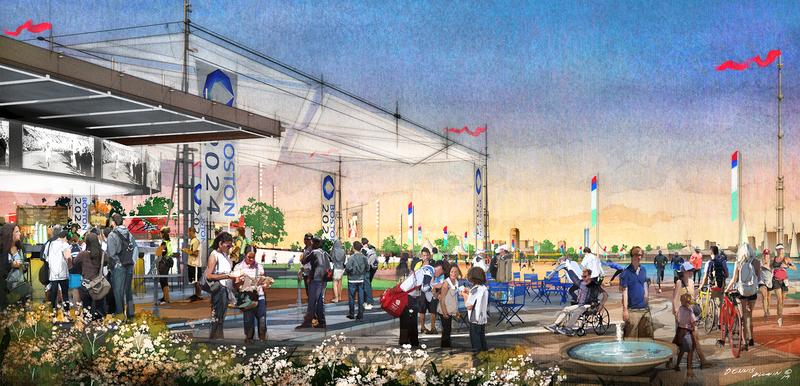USA: Boston’s wishful Olympic dream
source: StadiumDB.com; author: michał
 National Olympic committee of the US accepted Boston as the official candidate for the 2024 Olympic bid procedure. However, key elements of the vision don’t seem convincing at this point.
National Olympic committee of the US accepted Boston as the official candidate for the 2024 Olympic bid procedure. However, key elements of the vision don’t seem convincing at this point.
Advertisement
Earlier in July the US Olympic Committee (USOC) officially confirmed that Boston will represent the country in efforts to host the 2024 Olympics. It’s the first tournament without a host after Tokyo’s 2020 event and Americans will compete as in previous editions.
However, the Boston bid’s vision has some outstanding elements. One most important for us would be the 80,000-seat main stadium that is expected to be completely temporary. This would make it the largest single-event venue ever built.
Another principle in the bid is not using public funding to hold the games. While taxpayers would be asked for investment in roads and remaining infrastructure necessary to hold the games, sports venues would be built solely with private funding.

What’s the incentive for private capital? The Boston 2024 organizing committee wants to cover expenses with sources such as broadcasting fees, corporate sponsorships, and merchandising. One major issue with that part is that the International Olympic Committee is the benefactor of such revenues, not the local organizers.
Of course the IOC distributes majority of the revenue to various organizations, including organizers, but never in history was it possible to finance the tournament entirely with this source. While certainly a chunk of Boston’s investment may be recouped, with a budget of $4.5 billion the desire to finance all venues entirely privately seems fairly optimistic. Even if the plan does envisage making the most of existing infrastructure, like the Gillette Stadium.
In that context building the first fully temporary Olympic Stadium (priced at $350-550 million) sounds like a huge challenge. As experiences of other stadiums with temporary infrastructure show, temporary solutions may not only be as expensive as permanent, but even more expensive in the long term. After all, an 80,000-capacity stadium built specifically to fit IOC’s infrastructural regulations may prove costly not only to build, but to later dispose of.
Details of the 2024 bid, subject to further development, will show how realistic the scheme really is. Recent poll suggests a slight majority (55%) of citizens supports the scheme, but only if taxpayer money won’t be used. Should this principle not be met, 61% people are against the tournament. Social campaign No Boston 2024 was already established with roughly 100 people attending the first meeting.
Advertisement

 StadiumDB
StadiumDB